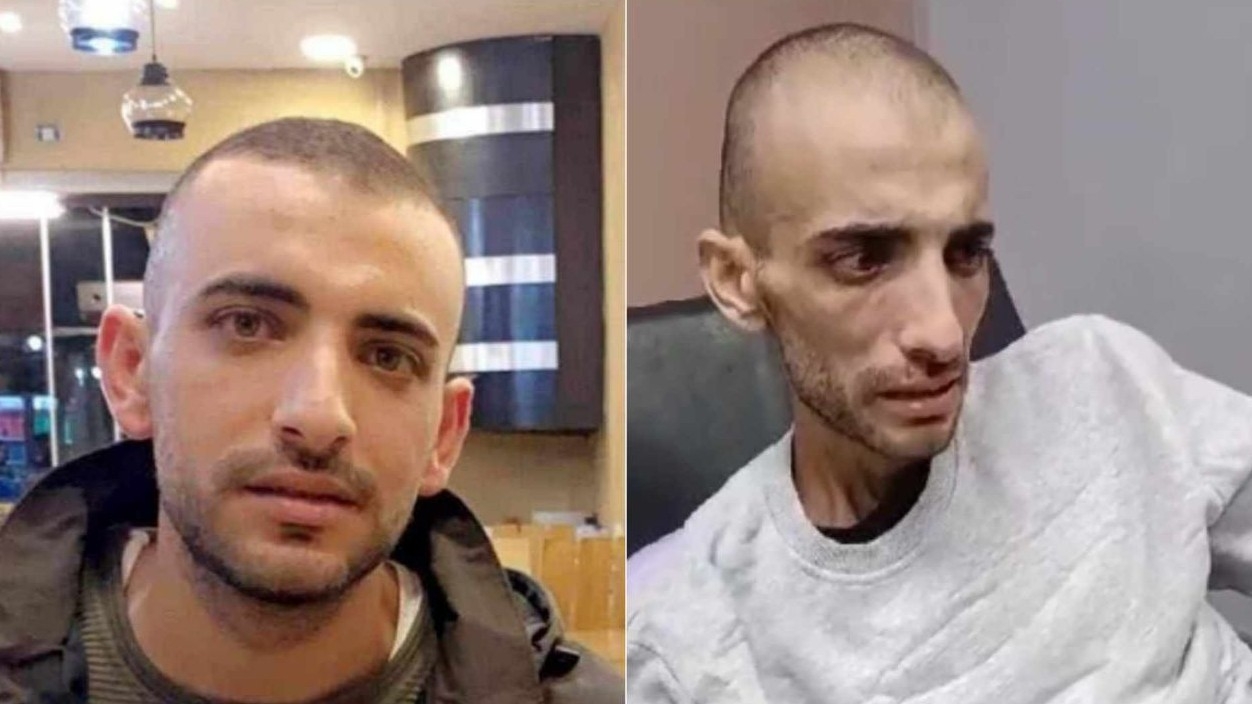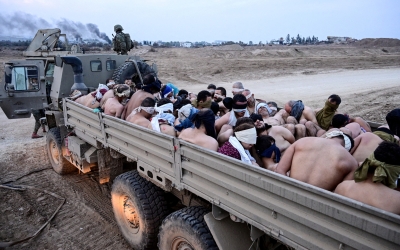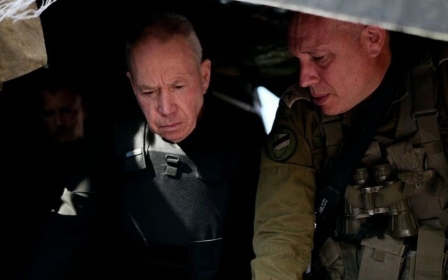Israel accused of negligence after photo of released Palestinian prisoner goes viral

Images of a gaunt young Palestinian man unable to stand after leaving Israeli detention have once again ignited debate over Israel's treatment of Palestinian detainees.
On Wednesday, Israeli authorities released Farouq al-Khatib, a 30-year-old Palestinian man who was arrested in August under what his family say were spurious charges.
His family told Middle East Eye that Khatib's health had seriously deteriorated while he was held in Israeli administrative detention for four months, where he lost around 25kg in weight and now weighs just 35kg, or 5.5 stone.
Images of Farouq, before and after his incarceration, have since gone viral on social media.
According to his brother, Hossam al-Khatib, Farouq was diagnosed with stage five stomach cancer shortly before his release from prison and is now receiving end-of-life care at a hospital in Ramallah, in the occupied West Bank.
New MEE newsletter: Jerusalem Dispatch
Sign up to get the latest insights and analysis on Israel-Palestine, alongside Turkey Unpacked and other MEE newsletters
It's unclear why Farouq was re-arrested on 23 August but his family said he completed a four-year prison sentence between 2019 and June 2023.
According to Hossam, Farouq was initially held at the notorious Ofer military prison following his re-arrest, but after the 7 October attack on southern Israel by Palestinian groups from Gaza, he was transferred to the Nafha prison in the Negev desert.
While there, a number of Israeli prison guards attacked the prisoners, Hossam said. "Farouq was hit in the stomach with a thick iron baton."
He added that his family knew nothing about the incident, but a former prisoner from his village who was released later conveyed Farouq's condition to the family.
According to the prisoner, Farouq suffered from severe pain in his abdomen region after the incident but prison authorities refused to provide him with medical treatment. He was also reportedly held in solitary confinement for three days, where he was deprived of sleep and food.
Later, he was transferred to the Ramla Prison clinic, where his health deteriorated and he suffered from dyschezia and persistent vomiting, the family said.
"Due to his deteriorating condition, the prison administration finally transferred him to Soroka Hospital where a biopsy was undertaken to reveal he was suffering from cancer," Hossam said.
"We contacted local and international human rights groups in an attempt to pressure the prison administration to accept that the lawyer visits him, but all our requests were rejected."
Released without any due care
On Wednesday morning, the family's lawyer notified the family that he was allowed to visit Farouq, and he called later in the evening to tell them that he was released at the Ni'lin checkpoint near Ramallah.
Now receiving treatment at the Ramallah government hospital, Farouq's distraught five-year-old daughter cried near his bay as Farouq howled in pain.
"We are very certain that the Israeli occupation released Farouq because his illness was in its final stages and after his health had completely deteriorated without providing any appropriate treatment," Hossam said.
MEE asked the Israeli prison authorities for comment but did not receive a response by the time of publication.
Palestinian human rights organisations have repeatedly condemned what they say is Israel's policy of medical negligence against Palestinian prisoners and have documented the deaths of dozens of ill prisoners in Israeli custody since 1967.
The World Health Organisation and the UN Special Rapporteur for Human Rights in the occupied territories have also raised concerns about the Israeli prison's treatment of sick Palestinian prisoners.
According to the Palestinian Authority, more than 500 male and female Palestinian prisoners in Israeli jails suffer from illnesses, including dozens with cancer.
According to prison rights group Addameer, there are at least 7,000 Palestinians in Israeli jails, including 200 children and 2,070 administrative detainees held without trial or charges.
Qassam, another of Farouq's brothers, was arrested after the 7 October attack and his family say they have no idea where he is being held and it is unlikely he knows about his brother's illness.
Middle East Eye delivers independent and unrivalled coverage and analysis of the Middle East, North Africa and beyond. To learn more about republishing this content and the associated fees, please fill out this form. More about MEE can be found here.





